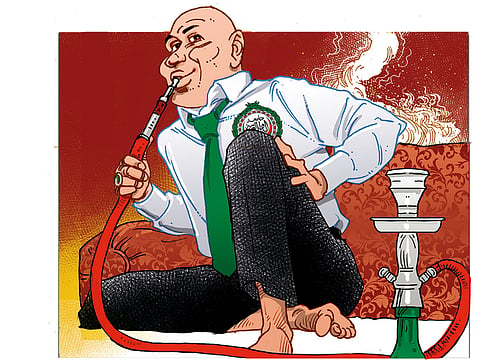Arab summit offered no new thinking
While it was disappointing to see members hold the line, in these troubled times, just trying to stop the chaos is an achievement

Last week’s Arab League summit was depressing in that it broke little new ground despite the chaos enveloping large parts of the region, and restated well-established Arab positions in 17 resolutions that had all been agreed well in advance.
The summit was chaired by Jordan, which succeeded in reaffirming the crisis in Palestine as a priority, second only to the fight against terrorism.
Palestine should never have stopped being an Arab priority, but the latest Israeli oppression in occupied Jerusalem made it easy for the Arab nations to rally to announce the support for the Palestinians even though little real action can be expected.
Despite the lack of vigour at the summit, there were some interesting shifts in the regional structures.
For example, it was important that Saudi Arabia’s King Salman Bin Abdul Aziz Al Saud had a one-on-one meeting with Egyptian President Abdul Fattah Al Sissi that broke the ice between them.
Even if it did not produce a major breakthrough, the meeting reinforced normalised relations despite their differences on Yemen where Egypt is not part of the coalition fighting Al Houthis, and on Syria, where Egypt has positioned itself close to Russia and Iran alongside the Syrian regime.
Another important meeting was a three-way gathering of host Jordanian King Abdullah with Al Sissi and Palestinian President Mahmoud Abbas.
All three are scheduled to meet US President Donald Trump this month, and a united Arab position will be important in dealing with the random thinking process of the new White House, especially in the light of Trump’s apparent readiness to look at any new ideas for a solution with no particular loyalty to the two-state solution.
It was a good thing that the summit reiterated its commitment to the Arab Peace Initiative based on the two-state solution and to a comprehensive settlement as a strategic choice, which gave the three Arab interlocutors with the Americans a common base position.
Growing international shift
On Syria, the summit followed a growing international shift in favour of President Bashar Al Assad, with the Syrian chair remain conspicuously vacant rather than occupied by the opposition.
The summit was held before the horrors of the latest gas attack were revealed, so the final communique remained part of an international effort that prioritises finding a stable government governing all of Syrian territory over any desire to punish Al Assad for his crimes.
This is fronted by Russia and Turkey working with Iran, with apparent American acquiescence, which means that Trump’s White House seems to agree that Iran can play a large role in Syria.
It remains to be seen if the gas attacks make any difference to this, but while the final communique defined the Arab position as seeking a political solution in Syria based on UN resolutions and the Geneva principles, it carefully avoided any mention of the future of Al Assad.
Previously the Arabs had insisted that Al Assad would have to go as part of any solution. In fact, Jordan had refused requests from Egypt, Algeria and Iraq to invite Al Assad to the summit, but in the light of the new pro-Al Assad feeling, Jordan did not invite the opposition either.
The final comment on Iraq was depressingly bland, calling on Prime Minister Haider Al Abadi’s government to initiate a political process that achieves national reconciliation and safeguards citizens’ rights without exclusion or discrimination.
This roundabout way of seeking to curb Iran’s sectarian influence did not do justice to the scale of the crisis in that country which split three ways, and the intensity of the government’s fighting in Mosul and its efforts to regain its territory from Daesh (the self-proclaimed Islamic State of Iraq and the Levant) with the active support of all its allies in the international coalition.
Libya’s beleaguered-but-internationally recognised Government of National Accord (GNA) headed by Fayez Al Sarraj won an important diplomatic victory by filling Libya’s seat at the summit, much to the discomfiture of Field Marshal Khalifa Haftar, whose army has been winning territory in the west of the country and rejoices in his new support from Russia.
The final communique urged Libyan parties to solve their differences and achieve national reconciliation based on the Sukhairat agreement of December 2015.
This rather unreal statement paid little recognition to the reality on the ground where Sarraj’s government has little traction against the other two rival governments based in Tripoli and Benghazi.
Priority: Fighting terror
The summit ended with Saudi Arabia taking over the chairmanship, and King Abdullah set fighting “terrorism as his first priority; it threatens Arabs and Muslims more than anyone else.”
His second priority was resisting Israel’s expanding colonies and the need for just and comprehensive peace.
The third was Syria, where the Arabs have little involvement other than to watch the two processes of Astana and Geneva try launch a political transition that will safeguard Syria’s territorial integrity.
Other priorities included Iraq, Yemen and Libya, and refugees. In normal times, any one of these seven issues would be a major crisis.
In these troubled times, just trying to stop the chaos spreading is an achievement, and any success in rolling back the anarchy is an important victory.
Sign up for the Daily Briefing
Get the latest news and updates straight to your inbox


